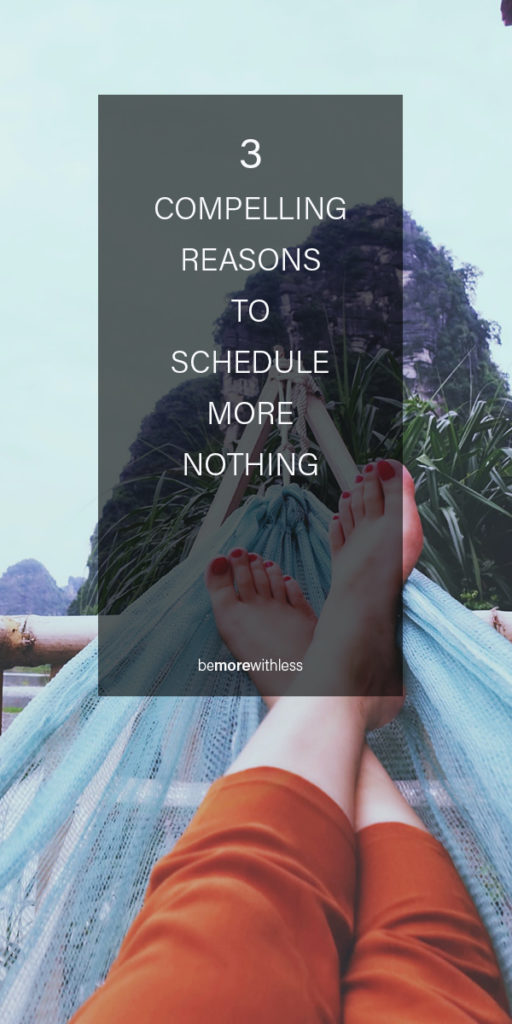If you struggle to do nothing, you are not alone. From overworking to the constant pressure (around us or within us) to prove who we are by what we do, we keep doing more things. Too many things.
It seems as if there is always more to do, so doing nothing can feel like a luxury we can’t afford. Even when the world shut down, we got busier and more overwhelmed. Our inability or unwillingness to slow down and do nothing is not serving us. When we refuse to do nothing, we compromise everything.
A powerful case for slowing down and doing nothing.
We can only take so much doing before our brains and bodies say, “enough” and we break down. The break down might not be obvious or dramatic but we lose focus, feel exhausted and struggle to be inspired or feel motivated. And then we think that we are supposed to feel like this because there is so much to do and feel and be.
As the saying goes, we are human beings not human doings yet we feel guilty and frustrated when we decide to do nothing. As we relax into nothingness, our brains are in constant search for more to-do’s. It scans your inbox, your text messages and all of the lists. Instead of enjoying doing nothing, you stress about everything.
Slowing down and doing nothing is a chance to find rest, delight and the way back to you.

3 compelling reasons to schedule more nothing
1. Creating margin makes room to better handle emergencies and surprises.
Test fate and plan your day, hour by hour. Don’t leave any room in between tasks, appointments or commitments. Emergencies and surprises consider this an invitation to show up and blow up the notion that you think you run the world, that you have control of things you don’t control. Instead create margin and leave a little room for nothing. The nothing may turn into something and you’ll have time for it. If the nothing is nothing, consider it bonus time for a nap, a walk, or just sitting quietly.
Adopt the habit of creating margin on your calendar, in your to-do list and wherever you need more space in your life. Margin is an aspect of our lives that is often overlooked. In terms of efficiency, you may think you’ll get less done and maybe that’s what it looks like if you are measuring over the course of day or a week. Change your time perception and look at it over the course of a year or a decade and chances are, you’ll have actually accomplished more, even though that’s not the point.
2. Less rushing around makes you a kinder person.
Rushing and busyness can feel like an addiction. It’s the most praised and socially accepted form of numbing out. Compare how you feel coming home after a day of back to back meetings with how you feel after coming home from a long walk (or gentle stroll). Consider how you treat people after constantly reacting to email, social media, people you work with, and your racing mind all day versus how you treat people after you’ve unplugged for a while and given yourself time to be alone; away from people and your digital devices. You are likely to have more compassion for yourself and others. You will be more present, softer, and kinder. If you are constantly rushing yourself and others, take a new path, a slower one.
3. Time for nothing invites you to remember yourself.
Doing nothing gives you the opportunity to listen to your heart and process ideas and emotions. Articles, Instagram posts and self-help books may encourage you to buckle down and do more but what do you want? After a day of non-stop input, you may have to recover, shut down, or numb out. Avoid that by slowing your pace and listening to your heart. Schedule more nothing if only to give yourself a minute to remember who you are, what you want, and how you want to live.
Delete your productivity apps and start checking your heart more than you check your phone.
More questions and thoughts to encourage you to do nothing.
- Prioritizing idle time isn’t laziness, it’s self-care.
- Who’s expectations are you trying to meet? Adam Grant says, “We spend too much time trying to reach other people’s standards, and too little time defining our own.”
- Is your busyness a vice or simply the modern way of life?
- Are your end goals to get more done or get something done well?
- If you are overdoing, are you underliving?
If doing nothing is hard for you, consider the benefits. Hanging around, puttering, daydreaming or whatever form your nothing takes is restorative for your mind, body, and heart. It’s a gift to you and everyone around you.
